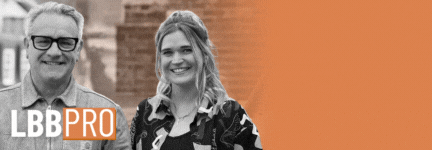
Bossing It: Adam Luck’s 'In It to Win It' Mindset

Adam Luck is a digital agency leader with 20+ years driving results for clients and agencies alike. Adam focuses on understanding client challenges/opportunities and assembling talented people to help solve the problem collaboratively.
Currently Adam is serving as the managing director, Canada for DAC Group; an international digital performance agency recognised by Forrester as one of the top Performance Marketing Agencies globally.
Previously Adam has worked at some of Canada’s finest media and creative agencies including Initiative, Reprise, Grip Limited, and Cossette. Adam is an HBA graduate from the Ivey Business School at Western University.
LBB> What was your first experience of leadership?
Adam> One of my first jobs was at McDonald's. I worked there for two years when I was 15 and 16, starting out in the kitchen and eventually getting promoted to a trainer. I was responsible for training new employees on how to make a Big Mac, how to fry the burgers, and all the other duties in the kitchen.
McDonald’s has a rigorous process to ensure consistency in every McDonald's around the world—and it was my role to teach that process. It was a great foray into leadership in a very structured and methodical process, which for anyone who’s ever worked at a QSR is very beneficial as it gets pretty hectic come dinner rush.
LBB> What experience or moment gave you your biggest lesson in leadership?
Adam> It's pretty recent, actually, within the last year and a half. Generally, I believe that we learn more from failure than we do from success. My team and I have been using the phrase 'in it to win it' recently and it's amazing to see the tangible outcomes you can achieve when everyone commits to a common goal and puts their full effort into something.
It’s been very different shifting the mentality from 'Let’s do a good job' to 'We really want to wow this client.'
So, that was a big moment for me. I don't think you can have everyone in that 'in it to win it' space 24/7 because you're going to burn people out. But identifying the key projects or client deliverables that we really want to excel at and then putting our full effort into it makes a big impact.
LBB> Did you know you always wanted to take on a leadership role? If so how did you work towards it and if not, when did you start realising that you had it in you?
Adam> When I think back to my youth, whether it's in school or activities outside of school with my friends, I always gravitated to more of a leadership role—like organising a team of people to take on a project. So, I think it's always been in me; it's something that I enjoy and gravitate towards.
LBB> When it comes to 'leadership' as a skill, how much do you think is a natural part of personality, how much can be taught and learned?
Adam> I do think it's natural and innate in people, but you can also learn and grow and become a leader—or become a better leader. The key attribute, though, is wanting to do it. If you try to force somebody into a leadership role but they don’t enjoy it, then you can teach them and help them grow but it's going to be a 'square peg in a round hole' type of scenario.
But if someone wants to be a leader, it's that kind of desire where leadership can flourish.
LBB> What are the aspects of leadership that you find most personally challenging? And how do you work through them?
Adam> Giving constructive criticism is the biggest challenge for me. I'm generally a pretty positive person, so it's not in my nature to deliver bad news or criticism to people. It's essential for the role of a manager and a leader, but it doesn’t come naturally to me, so it's something that I have to work on continually.
I’ve found that it’s important to find the right opportunity to deliver feedback, especially if it’s going to help somebody do things differently in the future. Even if you don't necessarily enjoy delivering criticism, remember that it’s important for that individual and for the project or outcome you're trying to drive.
So, for me it's about providing impactful feedback when and where it is appropriate.
LBB> Have you ever felt like you've failed whilst in charge? How did you address the issue and what did you learn from it?
Adam> If we're honest with ourselves, we all fail—if not daily, then certainly on a regular basis. But it's about learning from the small and big fails, and not being upset with yourself. It's about getting back up, learning from the experience, and doing better or doing differently as a result.
My manager gave me some good advice once: If you get knocked down, what matters is how you get back up, rally, and learn from the adversity you've just faced. You have to understand why something didn’t turn out the way you wanted or expected, then make a decision to change so that that you can overcome that failure or do things differently in a similar situation in the future.
LBB> In terms of leadership and openness, what’s your approach there? Do you think it’s important to be transparent as possible in the service of being authentic? Or is there a value in being careful and considered?
Adam> I prefer to be open and transparent whenever possible. That is kind of in my nature.
I’m a positive, social person—you might say a little bit of an oversharer at times—so in terms of my leadership style, I like to give people as much information as possible. Yes, you may need to keep a little bit back depending on the sensitivity of the information, but people generally want and need to be in the know. They want to know the information that’s relevant to themselves, to their roles, and to the company as a whole.
If you share that information, they’re better equipped to make informed decisions in the day-to-day.
LBB> As you developed your leadership skills did you have a mentor, if so who were/are they and what have you learned? And on the flip side, do you mentor any aspiring leaders and how do you approach that relationship?
Adam> I don't think for myself that I've actually had a mentor in the traditional sense. I'm typically not super structured. I like details but for some reason structure and rigidity is not something that I gravitate towards. So I would not say that I've had a formal mentor.
I have had a couple of managers who have been very senior leaders that I've regularly gone to, to seek advice based on certain situations or ask them their own experiences relative to something.
Although I don’t mentor anybody in a formal sense, I do have people that I get together with infrequently over coffee or a drink—people that I've either managed or worked alongside throughout my career—and catch up about their particular situations, whether it's career advice or something that they're working through personally or professionally. I'll give them my perspective and how I might approach their challenges.
LBB> In continually changing market circumstances, how do you cope with the responsibility of leading a team through difficult waters?
Adam> I see leading teams, making decisions, coming up with new ideas, and helping people grow as things that are typically associated with leadership. Those are all things that I enjoy and, happily, they tend to result in positive outcomes and happy clients.
But I don't really view them as 'coping'; they’re just natural parts of the daily life and the industry that we work in. Some weeks are going to be fantastic and other weeks are going to be a bit of a challenge.
LBB> So, for example, how did you cope with the responsibility of leading a team during the pandemic?
Adam> I don't think any of us were prepared for it. In those scenarios, you're talking about unprecedented times and an increased emphasis on one-on-one relationships. It's about being open and honest and transparent, and having the courage and openness to tell people, “I don't know, I don't have all the answers in this scenario, and I'm going through this just like you are.”
LBB> As a leader, what are some of the ways in which you’ve prioritised diversity and inclusion within your workforce?
Adam> I've had 20 years in the advertising agency world and the first 12 of those were in creative agencies. Working in a creative agency, you tend to work with a much broader set of people from a wide variety of backgrounds. What I've learned that when you have a team comprising of a wide variety of backgrounds and personalities, you’ll inevitably end up with differing opinions and approaches.
If you can be open to different perspectives on any given scenario, that often leads to better outcomes—although it can sometimes take a little longer to get from challenge to solution.
I try to hire people with different backgrounds and different educational experiences because it leads to more diverse ways to deal with challenges or solve problems or collaborate. The key is to ensure these people complement one another, so that’s always my priority.
LBB> How important is your company culture to the success of your business? And how have you managed to keep it alive with increases in remote and hybrid working patterns?
Adam> Culture can be a hard thing to define, but I do think it's very important. When I consider the culture of the teams I work most closely with, I think about it from a personal perspective. Do I want to spend time with this person? Can I trust them? Do they have my back? I think that's the foundation for building a great culture within a team.
I don't think remote work is a good way to work for the most part. There's always going to be exceptions to rules and times like the pandemic when you're forced into situations, but it’s very hard to build connections when you’re exclusively focused on a screen, the goal you’re trying to accomplish, or the next deliverable. You lose the human interactions; the day-to-day intangibles that are beyond but adjacent to your work life.
Our teams are in the office a minimum of two days a week and I make an effort to sit with them, listen to them, and share my opinions, both professionally and often personally. I make it a priority to socialise, go out for lunch, or simply chat on a regular basis. Those are the everyday elements that establish a culture within a team, a wider group, and—ultimately—the entire company.













